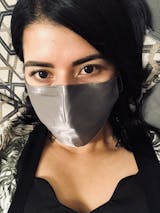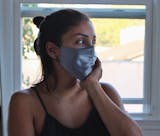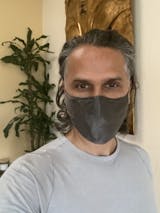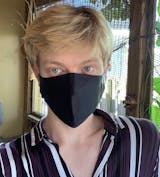Do you suffer from inflammation, redness, or skin sensitivity due to acne? Are you using acne treatments on your skin without any success of clearing it up?
Acne is the most common skin condition, affecting 50 million Americans annually. Most of us deal with acne in our teenage years, but for many of us it doesn’t stop there. It’s one thing to have pimples, blackheads, and whiteheads. It’s a whole other issue when we’re dealing with inflammation, redness, and aggravated skin.
In this article I’m going to discuss the causes of acne; the symptoms of acne; I’ll go through the ingredients to avoid, and why; and I’ll give you a list of sustainable beauty products to reduce acne inflammation.
Why We Get Acne
Without inspecting your skin, it would be impossible for me to prescribe you a specific diagnosis. But what I can tell you is that acne, and all of the side effects that come with it, are usually caused by one of these four things:
- Genetics
- Hormones
- Stress
- Medications
Without even knowing you, I can tell you that your acne is almost definitely caused by one of those factors. My advice to you is to look at all four of those causes and ask yourself which one you believe may be the cause of your acne. To help you, let’s dive in a little deeper.
Genetics
Genetics play a huge part in skin conditions we are prone to. So unfortunately this is a predisposition that we can never change, but we can absolutely manage it.
As a teenager, I had acne-prone skin, as did one of my brothers. In fact, our skin is almost exactly the same as our father’s skin, which obviously comes down to genetics.
At the time—over 20 years ago—there weren’t a lot of options available on the market, and I ended up using products that were harsh and ineffective. Brands like Clean and Clear, Clearasil, and ingredients like Benzoyl Peroxide were really the only solutions, besides going to a dermatologist, which we didn’t have the luxury of as a low-income family. But the more I scrubbed and “treated” my acne, the worse my skin felt—and looked. Sound familiar?
Hormones
This is arguably the most frustrating cause for acne out there. Because often we cannot control what our hormones get up to. Teenagers, pregnant women, anyone with hormonal imbalances, or anyone on medications that affect hormones (hello contraceptive pill!) are already going through so much with their bodies changing and acting weird. And hormonal acne adds another layer to our insecurities.
Hormonal acne is not a life sentence, though. It can be managed, but it takes patience, and some trial and error to treat.
Stress
Stress can affect literally everything in our life. When we are stressed our cortisol levels spike. This is when people who have autoimmune diseases or viruses, like cold sores, tend to suffer. Sometimes we lose or gain weight. Our hair can fall out. Our sleep patterns can be affected. And another lesser known symptom of stress can be acne.
Some people who have never had acne before in their life can find themselves with inflamed and aggravated acne if they’re going through a really stressful life event. But because acne isn’t something they’ve ever experienced before, often they don’t make the correlation.
I had a client once who was in her early 30’s, married with three children. She had started getting intense acne on her cheeks. I never saw anything like it before on someone who always had normal, clear skin. After inspecting her skin, and asking her some questions about her lifestyle, we couldn’t figure it out.
She saw me for weeks, and we thought we’d have the acne under control through weekly facials and prescribed home treatments. Then two weeks later I’d get a phone call because her acne would flare up again.
After a few months I built a rapport with her, and she became comfortable talking to me. She finally opened up that her husband had been having an affair and she knew about it, but was keeping it to herself. All of that pent up stress and emotion was wreaking havoc on her mental health, which was reflected in her skin.
Long story short, she finally sought help from a marriage counsellor, and sure enough, her acne went away almost by itself. She was just left with red marks and scarring, so that was what we treated in the end. I’ll give you some advice on how to do this later in this article.
Medications
Reasons why medications could affect your skin vary. Medications can cause hormonal imbalances, like hormone-replacement therapy. They can cause a reaction, which can result in acne. Steroids can also sometimes cause an acne-like rash called acneiform.
If your body is responding negatively to a medication, it means your body doesn’t like it. If possible, discontinuing the medication will be the best option for your skin. But in some cases where the medication is necessary, it is just not possible. So it's best to manage it with good quality skincare.
With acne, comes an onslaught of primary symptoms. Blackheads, whiteheads, papules, pustules, nodules, and cysts are all common symptoms that we look to treat when we have acne.
But there are secondary symptoms that accompany these that include redness, scarring, and inflammation. These secondary symptoms often get treated with the primary symptoms in the same vain, and this is how acne inflammation can worsen.
Ingredients to Avoid
Once upon a time not so long ago, using strong chemicals was the way many of us dealt with acne. Acne was treated like an enemy that we needed to eliminate as quickly and aggressively as possible. I’m not saying things have changed, because you can still get some pretty intense products on the market (hello Proactiv?). But the problem is, these products and ingredients can often do more harm than good.
Our skin’s microbiome layer, our acid mantle layer, and the lipid barrier's health are all imperative to our skin’s structure and function. So what happens when you use harsh chemicals on your skin is you damage the skin on a microscopic level.
Over exfoliation is one way we can unknowingly damage our skin. Another way is through using cleansers that are too intense, like foaming cleansers that contains sulfates.
We can also over-treat our skin with too many products. Even though you may be using all really great products on your skin, using too many at a time can have a negative effect on your skin. This is why a Skinimalist ritual is sometimes a better option.
If you have acne inflammation, what are some ingredients you should avoid, or use with caution?
Sulfates
As mentioned above, sulfates can damage our skin, particularly if you have inflamed, dry, or sensitive skin. Sulfates are often cheap foaming agents, which is why they are rampant in most cleansers. But they are known skin irritants, so best to steer clear of them.
Petroleum or Petrolatum
Apart from being one of the most un-environmentally-friendly resources out there, petroleum is derived from crude oil, a carcinogenic compound found in the earth. Although it has been distilled, and the toxic components have been removed, putting this on your skin is still a cause for concern. Petroleum also creates a barrier on the skin, which is essentially why they are added to formulations, however it can cause irritation, and can mask the inflammation instead of healing it.
Fragrance
I’m not talking about the organic or natural scent a product may have. I’m talking about synthetic fragrance that has been added to a product. I’ve mentioned it before, fragrance is a known endocrine disruptor, skin and lung irritant, and often can contain carcinogens. Reason being is that the industry is highly unregulated to protect brand’s patents and ingredient formulations for their fragrances. This loophole gives all cosmetic companies the opportunity to add whatever they like as a fragrance—which could be dozens, or even hundreds of ingredients, for all we know—and simply label it as “fragrance” with no other information.
Benzoyl Peroxide
This ingredient was first used as a topical acne treatment in 1934, and has become known as one of the go-to chemicals in many acne products. Benzoyl peroxide is a natural antibacterial agent, so for treating wounds and cuts it makes sense. But the issue with benzoyl peroxide is that it is also incredibly drying on the skin. When we have acne, it’s normal to want to dry out, or dehydrate the bacteria and pustules that are on our skin. So often we will use a benzoyl peroxide face wash. But this is one of the worst things you could do, as it ends up drying out our entire face, which, as I mentioned earlier, damages our skin's microbiome.
Retinol
While retinol does have some proven effective properties when used as a topical treatment, it can also have a downside. For anyone with sensitive or inflamed skin, retinol can actually further damage your acid mantle, opening your skin up to inflammation and infection. For anyone with normal, or even hardier skin, it’s also debatable whether or not retinol is truly beneficial long-term.
Ingredients to Use
As mentioned earlier, any skin with inflammation, redness, irritation, or sensitivity should be treated with care. Even if you’re battling pustular acne, attacking your skin will only make everything worse. Here are my top recommendations for ingredients to look for:
Turmeric
This ancient Ayurvedic ingredient has been used for centuries to treat skin conditions such as inflammation and hyperpigmentation. Using turmeric topically can give skin a brightening effect, and soothe any redness.
Marshmallow Root Extract
Marshmallow root is another anti-inflammatory ingredient. This is known to help with skin conditions like eczema and psoriasis, as well as rosacea. Marshmallow root is also hydrating, which is perfect for skin that needs some extra TLC.
Neem
Neem is an incredible antibacterial and anti-inflammatory herb used in Ayurvedic traditions for centuries. Neem is a powerful antioxidant that protects and soothes dehydrated skin.
Aloe
You may already know that aloe is a common ingredient used to soothe red and inflamed skin. Think of your after sun gels and creams, often they are made with an aloe vera base. Aloe is also perfect for oily skin as it is absorbed easily, and hydrates dehydrated skin without leaving a greasy residue.
Calendula
Calendula (marigold) is a botanical that has been used in Europe and South America for centuries to treat itchy, dry, red, and inflamed skin conditions. It has healing properties and can also help with minimizing fine lines and scarring.
Willow Bark
The bark from a willow tree is a soothing remedy that has been used for centuries to soothe inflammation and reduce bacteria. Willow bark contains salicin, a compound in which salicylic acid is derived. Salicylic acid is an effective active treatment for acne symptoms.
Blue Tansy
This small flower is packed with some incredible properties that are known to heal, soothe, and calm irritation and inflammation. As an oil extract, blue tansy can increase blood flow, reduce swelling, and is also high in antioxidants, which protect the skin from free radical damage.
Chamomile
Just like a pot of warm chamomile tea can calm your nerves, using this herb topically can have the same effect on the skin. There are many varieties of chamomile, such as German Blue Chamomile. But they all contain similar properties.Chamomile is high in polyphenols, and phytochemicals, which are known to protect skin from cellular damage, and can stimulate cell renewal, which is what skin with acne inflammation really needs.
Sea Buckthorn Oil
This relatively new kid on the block has been dubbed the Holy Grail by some herbalists. Known for its healing properties, as well as promoting skin renewal, sea buckthorn oil is a powerful botanical that acne sufferers would benefit greatly from using.
Sustainable Skincare Ritual to Treat Acne Inflammation
Before I run through the ritual, I want to point out why sustainable skincare is relevant. Sustainable skincare means that the ingredients have been sourced responsibly, so the future of that ingredient is sustained long term. This is something we should all be conscious of.
Sustainable skincare also means that the ingredients are going to be better quality, which is important if we want to give our skin the best possible outcome.
The ritual I've given you is a range of different beauty brands that are sustainable through their ingredients, packaging, and their operations.
Cleanse
Earthwise Beauty Marshmallow Face Cleanser
Ingredients: Marshmallow Root, Chamomile
Use morning and night.
Exfoliate once a week:
M.S.Skincare Retexturizing Glycolic Treatment
Ingredients: Neem and Aloe
Use once a week.
Mask
Earthwise Beauty Catharsis Face Mask
Ingredients: Aloe
Use after exfoliating.
Serums
Earth Harbor Aurora Superfood Luminance Ampoule
Ingredients: Sea Buckthorn Berry, Neem, Chamomile
Use morning or night.
Earth Harbor Marina Biome Brightening Ampoule
Ingredients: Blue Tansy
Use morning or night.
Earthwise Beauty Nap in the Meadow Serum
Ingredients: Turmeric and German Blue Chamomile
Use morning or night.
Moisturizer
M.S.Skincare Illume Radiance Enhancing Moisturizer
Ingredients: Neem, Willow Bark, Aloe, Turmeric
Use morning and night.
Oil
Honua Skincare ‘Ōlena Beauty Oil
Ingredients: Turmeric
Use morning and night on top of moisturizer.
Conclusion
When it comes to acne, although it’s tempting to treat it aggressively, it’s always best to treat each symptom with care. Sometimes less is more, so if you have been using a lot of products on your skin to no avail, stop for a week or two. Follow a simple ritual of cleansing and moisturizing morning and night until your skin settles down. Then you can start introducing the products I have mentioned in this article.
With a little patience and kindness, your skin will be glowing in no time.
Emma Masotti is an Australian now living in Austin, TX, and has been a trained esthetician for over 15 years. She is a sustainable skincare writer, educating and building awareness around proper skin health that doesn’t cost the earth.
Some of the products promoted in our blog are from our online store. Many others are brands we have researched and found to be great examples of sustainable, ethical, and innovative brands in their field, and we don't make any profit from mentioning them in our blog. #CollaborationOverCompetition










